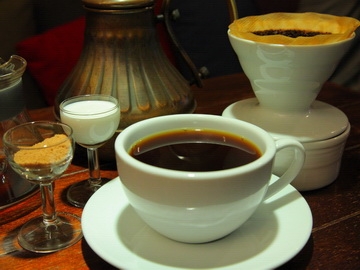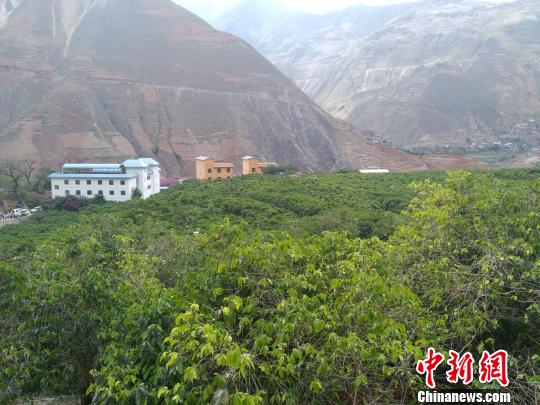German post-90s come to China to start a Chinese roasted coffee to enter the Chinese market

For professional baristas, please follow the coffee workshop (Wechat official account cafe_style)
There are several German post-90s, they are from Hanover, Germany, Fabian (Fabian), 26, and Chinese-German mixed-race Isabel (Isabel), 23, Fabian's brother Flemming (Fleming) and 23-year-old friend Constain (Constantine). They came to Changde, Hunan Province in 2016 to set up a Han roasting coffee workshop (cafe) in a small German town on the banks of the Purple River. in addition to providing authentic German coffee and delicious food for locals and tourists, they also have a more ambitious goal. that is to bring the popular boutique coffee in Germany to Chinese coffee lovers.
Fabian's family runs Hanover KaffeeManufacture (HKM), a famous coffee company in Germany, and coincidentally, it came to China through the Hanover government, giving birth to the "Han roasting Coffee Factory" in Changde German style Street.
HKM was founded by Andreas Berndt and his son in Hanover, the capital of Lower Saxony.
Mr. Berndt has a passionate passion for coffee and has mastered all aspects of coffee through years of self-study, travel study and professional certification from famous coffee schools in Europe.
His dream is to use the Viennese roasting method to bake coffee beans. In his opinion, this method is the softest, most fragrant and most professional baking method.
The German coffee market is very mature and the competition is fierce. HKM's high-quality coffee beans satisfy picky customers and are popular in and around Hanover in a short period of time, as well as many other cities in Germany. HKM coffee is mainly consumed by private customers, high-end hotels, restaurants and cafes, as well as quality retail stores, with a variety of more than 30 kinds of coffee beans from around the world, each with surprising tastes, from nutty to chocolate to fresh fruit to floral flavors. Wait.
Now, Mr. Berndt's second son Fabian and his son Dehua mixed-race partner Isabel lead their young team into the unknown world: entering the Chinese market, determined to provide high-quality roasted beans to Chinese coffee lovers.
Excellent quality starts with the raw coffee beans wrapped in the coffee fruit on the coffee tree.
Coffee saplings must grow carefully in a natural environment with rich soil to grow into healthy and fragrant coffee trees.
Coffee trees must also be carefully cared for for 3-4 years before they can bear their first fruit.
Han roasted coffee spares no effort to select trustworthy coffee growers to ensure the quality of raw beans in this first step. I would rather choose a more expensive small-scale plantation than a cheaper single cultivation supplier that provides pure natural growth free of any harmful diseases and pests or raw coffee beans using chemical fertilizers.
All raw coffee beans are supplied by professional and reliable importers of Hamburg and Bremen in Germany and have undergone extremely stringent inspections in Germany before being exported to China.
In order to achieve a comprehensive, deep coffee flavor, raw coffee beans must be roasted to chocolate brown and roasted by hand in a 25kg German-made Probat drum roaster.
Bakers must spend a lot of time baking at low temperatures while constantly checking. This roasting ensures that you can taste the full aroma of all the oils in the beans with every cup of coffee you enjoy. This is also the safest way, because dangerous carcinogenic polymers will be suppressed to a minimum and all healthy antioxidants are retained in coffee beans.
Important Notice :
前街咖啡 FrontStreet Coffee has moved to new addredd:
FrontStreet Coffee Address: 315,Donghua East Road,GuangZhou
Tel:020 38364473
- Prev

Experts and scholars from five countries in Yunnan Binchuan discuss the new development of century-old coffee
Professional baristas please follow the coffee workshop (Wechat official account cafe_style) on the 16th, coffee experts and scholars from China, the United States, Ethiopia, India and France gathered in Zhukula Village, Binchuan, Yunnan Province to open the Zhu Kula Coffee Forum to discuss the future of the century-old coffee-Zhukula Coffee, in order to help ethnic minorities shake off poverty and become rich and Yunnan Coffee goes out. Chinanews.com, Binchuan, Yunnan
- Next

The world's first Kiehl's Cafe is located in Taipei
For the exchange of professional baristas, please follow the coffee workshop (Wechat official account cafe_style) Kiehls's first coffee compound shop in Taipei, coffee is very New York style. Photo / Kiehls has many precedents for providing fashionable cross-industry catering. The American New York brand Kiehls Cheers, which took four years to prepare, finally opened the world's first coffee shop K on the first floor of Xinyi Xintiandi A11, Xinguang Sanyue Taipei.
Related
- The ceremony is full! Starbucks starts to cut the ribbon at a complimentary coffee station?!
- A whole Michelin meal?! Lucky launches the new "Small Butter Apple Crispy Latte"
- Three tips for adjusting espresso on rainy days! Quickly find the right water temperature, powder, and grinding ratio for espresso!
- How much hot water does it take to brew hanging ear coffee? How does it taste best? Can hot water from the water dispenser be used to make ear drip coffee?
- What grade does Jamaica Blue Mountain No. 1 coffee belong to and how to drink it better? What is the highest grade of Blue Mountain coffee for coffee aristocrats?
- What are the flavor characteristics of the world-famous coffee Blue Mountain No. 1 Golden Mantelin? What are the characteristics of deep-roasted bitter coffee?
- Can I make coffee a second time in an Italian hand-brewed mocha pot? Why can't coffee be brewed several times like tea leaves?
- Hand-brewed coffee flows with a knife and a tornado. How to brew it? What is the proportion of grinding water and water temperature divided into?
- What is the difference between Indonesian Sumatra Mantinin coffee and gold Mantinin? How to distinguish between real and fake golden Mantelin coffee?
- What does bypass mean in coffee? Why can hand-brewed coffee and water make it better?

